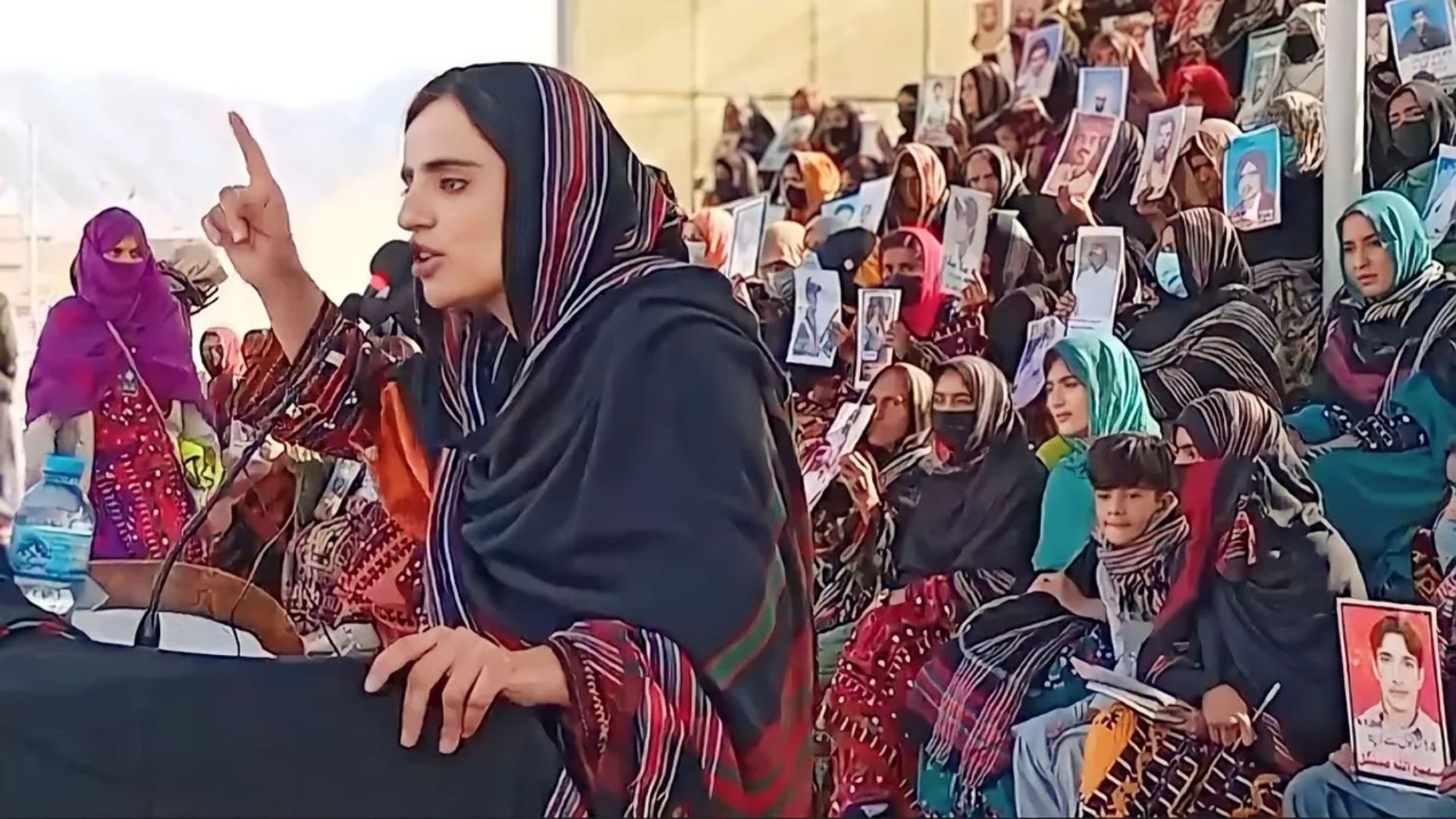


A Baloch rights activist and several others have been booked by the Quetta police for their alleged involvement in a protest against enforced disappearances and extrajudicial killings on May 18. The FIR against the activist has sparked widespread condemnation from journalists and activists, with many taking to social media to express their support and call for an end to state institutions' unfair treatment of peaceful Baloch. The lockdown of the Press Club on the day of the protest has been seen as a violation of press freedom and has even prompted a boycott of a session of the Balochistan Assembly by journalists.
Background
Balochistan, Pakistan's southwestern province, has been plagued by a longstanding pattern of enforced disappearances and extrajudicial killings. The victims, often political activists, students, and journalists, are abducted by security forces or unidentified assailants and held without due process or legal accountability.
The issue gained international attention in 2005, when the UN Working Group on Enforced and Involuntary Disappearances reported over 1,000 cases in Balochistan. Despite promises from the government to end the practice, disappearances and killings have continued unabated.
Recent Events
On May 18, 2023, a protest was held in Quetta, Balochistan's capital, to mark the "Baloch Missing Persons Day." The demonstration was organized by the Baloch Human Rights Organization (BHRO) and other rights groups.
During the protest, the police arrested several activists, including Baloch rights activist Nasrullah Baloch. The police also raided the Quetta Press Club, where journalists were covering the event.
Alleged Police Involvement and Condemnation
An FIR (First Information Report) was registered against Nasrullah Baloch and other activists, accusing them of "sedition" and "inciting violence." The FIR sparked widespread condemnation from journalists, activists, and human rights organizations.
Many took to social media to express their support for the detained activists and call for an end to the state's unfair treatment of peaceful Baloch dissenters. The lockdown of the Press Club on the day of the protest was seen as a violation of press freedom.
Top 5 FAQs and Answers
1. Why are enforced disappearances happening in Balochistan?
The reasons for enforced disappearances are complex, but they often involve government attempts to suppress political dissent and maintain control in a volatile region.
2. Who is responsible for the disappearances?
Security forces and unidentified assailants have been implicated in the disappearances. However, the government has denied responsibility, despite evidence to the contrary.
3. What is the government's response to the issue?
The government has repeatedly promised to end enforced disappearances, but these promises have not been fulfilled. In some cases, the government has even been implicated in the cover-up of disappearances.
4. What is the impact of enforced disappearances on Balochistan?
Enforced disappearances have created a climate of fear and uncertainty in Balochistan. They have also eroded public trust in the government and the security forces.
5. What can be done to address the issue?
The international community, human rights organizations, and the Pakistani government must work together to end enforced disappearances in Balochistan. This includes holding perpetrators accountable, providing reparations to victims, and implementing measures to prevent future disappearances.

JD Vance, the current US Vice President, publicly criticized Zohran Mamdani, a Democrat running for the position of New York City Mayor, for his recent comments about Islamophobia and 9/11. Vance argued that Mamdani's remarks failed to acknowledge the 3,000 individuals who lost their lives and those who were injured during the terrorist attack. Mamdani, who shared his aunt's experience of discrimination post-9/11, spoke at a mosque in the Bronx and highlighted the fear that many Muslims faced in the city.

In honor of World Polio Day, local restaurants in Minnesota are teaming up for the "End Polio Now" event to raise awareness and funds for polio eradication. From 7 a.m. to 7 p.m., residents are encouraged to dine at participating restaurants where volunteers will educate them on the impact of polio worldwide and how to help. The event's signature sponsor, Eagle Rock, along with other local restaurants, will donate proceeds to Rotary International, which uses funds to provide polio vaccines to children in vulnerable areas. This effort is crucial given that polio continues to be a problem in some parts of the world, even though it has been eliminated in the US since 1979.

In a tightly contested race for the Rajya Sabha seats in Jammu & Kashmir, the ruling NC alliance emerged victorious, securing three out of the four seats. The BJP, which held only 28 seats in the Assembly, had hoped for a win through cross-voting or support from smaller groups. However, the NC's dominant position in the 88-member Assembly reaffirmed voter trust in their post-Article 370 political stability. PDP President Mehbooba Mufti also congratulated the NC candidates and expressed hope that they will strongly represent the people of Jammu & Kashmir in Parliament.

Mayor Derek Slaughter has vetoed a recent city ordinance that limits the terms of elected officials, citing concerns about retroactivity and lack of language addressing current officials. This veto comes after the ordinance was adopted in a 6-0 vote by City Council, with the mayor absent. If legally challenged, the defense of this ordinance could result in unnecessary costs for taxpayers. The mayor's decision has sparked a response from council members, with attempts to reach them for comment.

Prime Minister Narendra Modi addressed his first election rally in Bihar and expressed confidence in winning the upcoming polls. He mocked the opposition INDIA bloc and praised the unity within NDA, highlighting leaders like Nitish Kumar, Chirag Paswan, Jitan Ram Manjhi, and Upendra Kushwaha. Modi also criticized the 'jungle raj' under RJD and Congress and highlighted Bihar's progress under Nitish Kumar's tenure. Despite the upcoming Chhath festival, the PM thanked the crowd for attending and described the recent GST rate revision as a 'festival of savings'.

The suspension of Praveen Kumar K P, a PDO serving in Sirwar taluk of Raichur district, for participating in an RSS rally has sparked controversy in Karnataka. BJP leaders have condemned the move and promised to fight it legally, claiming that the officer's right to participate in such events is protected by law. Meanwhile, the state's Rural Development Minister has written to the Chief Minister for a ban on RSS activities on government premises, further intensifying the issue.

In a heated verbal exchange, Maratha quota activist Manoj Jarange Patil accused NCP Minister Chhagan Bhujbal of attempting to create a rift between the OBC and Maratha communities for political gain. During a recent OBC rally in Beed, Bhujbal and Dhananjay Munde attacked Jarange, with Pankaja Munde, a BJP OBC leader, watching from the sidelines. Jarange also praised Chief Minister Devendra Fadnavis and Minister Pankaja Munde for staying away from the rally and emphasized the unity of the OBC community. Bhujbal, on the other hand, warned Jarange against challenging the community's rights and vowed to stand up against any attempts to divide them.

On the auspicious occasion of Bhai Dooj, Madhya Pradesh Chief Minister Mohan Yadav transferred a total of 44,900 crore directly into the bank accounts of 1.27 crore women beneficiaries under the Ladli Bahna Yojana. This initiative aims to support and empower women in the state, with each eligible woman set to receive 1,500 per month from November onwards. During the special program at the Chief Minister's residence, Yadav extended his wishes for a happy Bhai Dooj, emphasizing the importance of the brother-sister relationship and the government's commitment towards ensuring the safety and well-being of Ladli Bahnas in the state.

Union Home Minister Amit Shah celebrated the Gujarati New Year and his 62nd birthday in his hometown of Ahmedabad, surrounded by senior political leaders, party members, and well-wishers. Shah's rise in public life through the RSS and his partnership with Prime Minister Narendra Modi have shaped Gujarat's and India's political narrative. His sharp organisational mind, efficient approach, and booth-level political management have been key in building the "Gujarat model" that gave the BJP an enduring edge. Despite transitioning to national politics, Shah's political heart still beats in Ahmedabad, as evident in his New Year celebrations and plans to meet the newly appointed ministers of the Gujarat cabinet.

In a recent incident at the Vasai Fort in Maharashtra, a man dressed as Chhatrapati Shivaji Maharaj got into a heated argument with a security guard over language. The man, who was recording a video, berated the guard for not speaking Marathi and disrespecting the legacy of Shivaji Maharaj. Social media users were divided in their opinions, with some criticizing the man's behavior while others felt the guard needed to be taught a lesson.